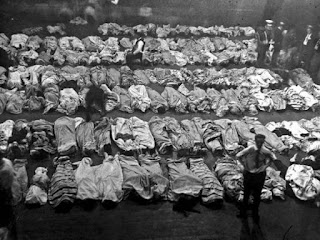Bill Knight column for Mon, Tues., or Wed., July 27, 28 or 29
It can be tempting to think 21st century business is running roughshod over everything.
However, though it’s timely to fret about “too big to fail” banks and business-smooching “turnaround agendas,” persistent “trickle-down economy” theorists and stark income inequality, Big Business’ power over government elected by voters to represent everyday people also is timeless, as shown by one of Illinois’ worst tragedies, which occurred a century ago this week.
A new book and an old dispatch from Illinois writer Carl Sandburg both connect the Eastland tragedy and the trouble with unaccountable business.
About 7 a.m. on Saturday, July 24, 1915, the 260-foot Eastland steamship boarded about 2,500 Western Electric workers and their families for a trip from Chicago to a company picnic in Michigan City, Ind. While still docked, the ship rocked, tipped and finally capsized in 20 feet of water yards from shore near the Clark Street Bridge over the Chicago River, and 844 people died.
The outing was to be a perk for workers (who had little choice and, in fact, had to pay for “proper attire,” according to later reports). The catastrophe was avoidable, according to journalist Michael McCarthy, whose book “Ashes Under Water” (Lyons Press) reveals that he ship’s owners knew the dangers but delayed making needed repairs.
McCarthy’s years of research with the National Archives and other sources show that the Eastland’s owners realized the ship was unstable but dismissed safety concerns for business reasons.
Prosecutors “tried to bring charges against the crew, the inspectors and the ship owners,” said McCarthy, a former Wall Street Journal reporter and editor. “There were exhibits that showed that the owners knew there were mechanical problems with the boat and they planned to repair it.
“One of the officers of the company started asking questions about repairing the stability of the ship,” McCarthy said, “and they decided to postpone them. This is where the really heartless side of this is: basically they said, ‘Let's not hold up ticket revenues’.”
It was after progressives in Washington started reining in monopolies and uncontrolled business, just a few years after “The Jungle,” Upton Sinclair’s novelistic expose of conditions in the meatpacking industry. But a few reforms weren’t enough to save the hundreds of Eastland victims.
No one paid the price, McCarthy writes.
“People who were responsible were exonerated,” he said. “It was one of the great injustices of the 20th century.”
That didn’t escape the notice of Galesburg native Sandburg, a Pulitzer Prize-winning biographer, poet and journalist then working for Scripps’ Daybook newspaper. A few months after the disaster, Sandburg wrote a column for the International Socialist Review, blasting business and government officials who kowtowed to industry – especially U.S. Secretary of Commerce William Redfield.
Redfield was an acolyte of renowned “efficiency expert” Frederick Winslow Taylor, whose ideal based on time-and-motion studies seeking to improve production had been instituted by many businesses.
“Why didn't this ideal work out in the bureau of Steamboat Inspection Service directly responsible to Redfield?” Sandburg wrote. “There's one answer. Business required it.
“Grim industrial feudalism stands with dripping and red hands behind the whole Eastland affair,” he continued. “The business interests who run the Great Lakes and the coast and the oversea steamship lines told Redfield everything was all right … and there was no danger. So he, like a faithful bureaucrat, considering himself responsible only to business [and] lifted no finger.”
Redfield and the Eastland’s owners had been warned about the risks by unions but to no avail, Sandburg wrote, so “the Eastland became a coffin boat from which truckloads of dead working people were hauled away.”
The faulty Eastland had sunk “to the river bottom like a dead jungle monster shot through the heart,” Sandburg wrote, “the ghastliest commentary on American efficiency so far written into national history.”
Ghastliness remains, from billionaires buying political candidates thanks to the Supreme Court’s “Citizens United” ruling, to bills written by the Koch brothers’ American Legislative Exchange Council, to the sheer number of influential lobbyists who demand attention from lawmakers who are supposed to listen to constituents.
Such business practices could cause today’s ship of state to founder.
[PICTURED: A 1915 photo of some of the hundreds of drowning victims from the Eastland disaster.]


No comments:
Post a Comment
Note: Only a member of this blog may post a comment.